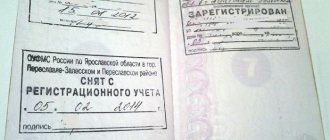Dear visitors!
Please note that the articles are for informational purposes only and do not relate to the services of the developer!
If you are interested in this service, please contact specialists on this issue.
The question of how to register a person in an apartment is asked by almost all citizens. Some people need to register their relatives or children, while others need registration themselves. Let's look at the basic rules, registration requirements and its nuances.
The term registration lost its relevance back in 1993, with the adoption of the Law on Freedom of Movement, Choice of Place of Stay and Residence No. 5242-1 of June 25, 1993 (last amended April 2019). But this word is still used in everyday life as more understandable and familiar. Further we will apply such concepts as: registration at the place of residence (= permanent registration) and registration at the place of stay (= temporary registration).
Rights and responsibilities of citizens
The state has introduced a mandatory registration regime for all citizens on its territory.
Registration on the territory of the Russian Federation, or registration in common people, is the responsibility of every person. However, its absence cannot be used as a reason for limiting any rights of a citizen. There are simply fines for its absence.
If having a residence permit is a person’s responsibility, then the ability to register another person in an apartment can be both an obligation and a right. In the first case, such an obligation is assigned to certain officials, as well as to parents in relation to minor children. But the right exists for any person who is the owner of a residential premises or rents an apartment for social rent.
Registration for citizens of the Russian Federation is provided free of charge; for foreigners the state fee is 350 rubles.
Legislative framework
What laws govern this? The legislative framework regulating indirectly or directly the issues of migration registration is quite rich and is represented by:
- Civil Code of the Russian Federation , which establishes the rights of the owner of real estate and other general civil rights;
- The Housing Code of Russia defines the rules for registration from the perspective of housing law;
- Law No. 5242-1 of June 25, 1193 gives citizens the indisputable right to freely change their location within the country’s borders;
- Government Resolution No. 713 contains the main provisions for registration of registration;
- The Code of Administrative Offenses establishes a fine for failure to register beyond the permitted period;
- Criminal Code defines liability for fictitious registration.
You can learn about the difference in the concepts of “registration” and “registration”, as well as how temporary registration differs from permanent registration on our website.
Two types of registration
Registration at place of residence
also called permanent residence. It records the fact that a person lives in a specific place on a permanent basis. The citizen’s duty in this case is to register within 7 days.
Temporary registration
– this is registration at the place of stay. A person is required to register temporarily if he plans to stay in a given place for at least 3 months. At the same time, temporary registration does not deprive him of the right to permanent registration.
How to temporarily register a person in your apartment? The procedure is no different from permanent registration, it’s just that with permanent registration a special stamp is affixed to the passport, with temporary registration a certificate with a red stamp is issued indicating that the person has a residence permit.
Register a friend with a child to stay with you
Anonymous wrote: >> Selling an apartment with registered minors is exactly the same as selling without them.
Registration is not property. Not certainly in that way. After the July (or whenever) decision of the Constitutional Court, not everything is so clear. a number of buyers will definitely disappear
1. As far as I know, the deed of gift is issued ONCE. This is what distinguishes it from a will, which can be rewritten to someone else at any time.
2. It’s more difficult to sell or not, I don’t know for sure. BUT THEY CAN SIGN OUT “TO ANYWHERE” if she asks for it at the passport office! (ask the realtors for a link to the law so she can say this if she is refused at the passport office).
2. I would not recommend prescribing it to you, because... The situation in life changes and you can turn from best friends to worst. (Example: A situation where she says that the apartment has been sold, prices for alternatives have gone up and she can no longer buy anything, and it’s winter outside. What do you think she will prefer: to live with you (and formally she can live in your apartment for 6 months up to a year, depending on registration) or go “out on the street”). And add also the fact that they may not get along with your husband for some reason and he will say: “Either me or a friend.”
Do you need this hemorrhoid?
Exit: Invite her to register in her parents’ apartment (she will not have rights to it by law, only registration). At the same time, your parents will be happy to move the apartment (where their share is), and accordingly do what your friend needs. Good luck to you and her!
What documents will be required
Required documents:
- Application in the prescribed form (issued on site).
- Passport of the person registering in the housing (child’s birth certificate).
- Documents establishing the rights to the apartment. Depending on the type of room, this may be:
- certificate of ownership of the apartment or part of it;
- warrant, social, municipal, official employment contracts (or their number should be indicated, since they are at the disposal of state bodies and their submission is not required);
- a court decision on moving into housing can also be a special document.
- Passport of the owner or tenant.
Additional documents:
- When registering in a municipal square - permission from municipal services.
- If the apartment is in shared ownership - permission of all property owners.
- If the apartment is on social rent and a non-family member is registering, the consent of all adults is required.
In these two cases, third parties may be required to personally appear and sign on the application, or each of them must sign their own document. It is also possible to provide a notarized permit.
- When registering in a communal apartment, everything will depend on whose ownership the square meters are - relevant documents will be required either from the owner or from the municipality.
- If there is a document stating that the person was discharged from the previous place, but in principle the discharge process can occur automatically at the time of new registration.
The specified list is submitted to the subscriber department or to the Multifunctional Center for the Provision of State and Municipal Services (MFC).
Documents can also be provided to authorities through State Services in electronic form.
special conditions
In emergency housing
Sometimes residents of emergency buildings need to register, for example, relatives. Theoretically, there should be no obstacles to this, since the law on the right to movement does not say anything about prohibiting living in such places . Registration of citizens does not depend on the state of disrepair of the premises and how much it needs repairs.
However, in practice this can be quite difficult to do. Citizens living in houses undergoing demolition are applying for new apartments under the resettlement program. Naturally, the tempting offer attracted scammers, so it was proposed to register only the owner’s immediate relatives.
But none of the codes or government regulations have contained any specific instructions on this matter, so there are simply no legal grounds for refusing registration.
The only thing that, with a certain degree of convention, can be considered a legitimate motivation for refusal is the provisions of Art. 15 of the Housing Code, which states that occupancy in residential premises is possible only if it complies with sanitary and other standards. However, until emergency housing is officially recognized as not meeting these requirements, moving into it is permitted.
In mortgage
Registration in a mortgaged apartment is an even more complicated situation. The inconsistency is caused by the lack of specific instructions at the legislative level .
Most often, the agreement is drawn up by the banks themselves, coming up with various conditions regarding the registration of the borrower’s relatives and other persons, and almost every bank insists on mandatory notification of registration of any citizens in the encumbered apartment. Some credit firms even require an obligation to deregister minor children if they suddenly become unable to pay the mortgage.
There are no rules regulating such issues in the existing federal legislation, although the meaning of the existing laws still allows citizens to defend their interests, including the registration of third parties.
For example, the Civil Code and the Federal Law “On Mortgage” (Part 1, Article 346 and Article 29, respectively) state that the mortgagor has the right to use his property at his discretion, if this does not contradict the law and the purpose of the property. And from the point of view of the law, the mortgagor is the owner of the disputed housing, albeit encumbered with a mortgage. The bank in this case is just a mortgagee, so it can limit the owner of the apartment only in those actions that are provided for by law.
Consequently, in the event of unlawful actions of credit institutions, the owner of the apartment can go to court, but it is better to do this as a last resort. It is easier and more efficient to agree on all issues with the bank before signing the agreement. If there are any points on which it is not possible to reach an agreement, then it is better to go to another bank and thereby avoid problems in the future.
You may be interested in learning about how an apartment is sold with a mortgage.
In the communal
The nuances of registration in a communal apartment:
- If a room in a communal apartment is the property of a tenant, then he can register anyone to live with him, without being interested in the wishes of his neighbors.
- If the room is municipal property, then the citizen who owns it on the basis of a social tenancy agreement can register any persons in his living space, if this does not contradict the law.
The common property of a communal apartment is the kitchen, corridor, bathroom, balcony and similar premises.
Naturally, the newly registered tenant will also use them, and only when he does this inappropriately will the rights of the neighbors be violated.
Documents required for registration:
- Passport of the person wishing to register
- Statement.
- A document that confirms the right to move in.
- Statements from all adult owners of the room that they are not against the new tenant.
Municipal housing
The tenant of a municipal apartment has the right to register both temporary and permanent residents in it (Article 67 of the Housing Code). But there are certain rules here. How to register a person in a municipal apartment legally and without legal delays?
If you can register any number of individuals in your own apartment and the law does not limit the owner in this, then in municipal housing the number of meters of living space per person is considered (in different regions from 8 to 18). If the footage does not allow, it is not possible to register a person.
The registration permit is issued by the Property Management Department after reviewing the application, subject to availability (that is, if the meters allow). The only exception to this rule is the registration of minor children. The child is registered with the parent, regardless of whether there are conditions for this, and permission is not required.
Family members of the employer are registered with his consent without obtaining permission from third parties. This applies to the following relatives:
- spouse);
- children;
- parents.
But how can you register a stranger in a social rented apartment? This will require the consent of everyone else registered, even if you are the main employer.
Rights of the owner of the premises
Despite the fact that the right does not arise, a registered citizen cannot lose his place of residence instantly. To deprive citizens of registration, the owner of the apartment must contact the court.
If there is a child, in most cases the court gives a certain period for the registered citizens to find new housing.
The law, which is in force in 2021, protects the rights of the owner, so as a result of the lawsuit, he will always win.
Quite often it happens that the owner of an apartment has to spend time and effort to vacate his apartment actually and legally.
Resolving disputes through court always requires a lot of time and money. Therefore, it is best to try to resolve the conflict peacefully.
You can sell an apartment with such problems only at a low price, since there are enough offers on the real estate market.
The owner of a residential premises should think everything over carefully before registering tenants . If children are born to them, then in accordance with the law they will be registered in the same place as their parents. The consent of the owner and other family members is not required.
Communal apartment
Unfortunately, there are no fewer communal apartments these days. On the contrary, very often former close people become strangers, divide their accounts and either live in the same area as in a communal apartment, or sell their part to others.
Communal housing is housing in which several owners live (and they can be not only individuals, but also the municipality), they have a living space allocated for each, as well as places for common use.
How to register another person in a communal apartment? The owner of a communal apartment has all the rights of an ordinary, sole owner. He can register anyone for his living space, the main thing is that this area is allocated in the form of a separate room.
If the communal apartment belongs to the municipality, then the rules of the municipal apartment apply. When registering other persons, it is necessary to obtain permission from the Department and other persons registered. When receiving permission from the municipality, compliance with area standards also plays a big role.
2 room apartments on Moskovsky Prospekt Go to
What can you do with your share?
I see two options: sell or rent out the share to co-owners.
Sell the share to co-owners. Obviously, they want to live in an apartment as usual. But they may not have the money to buy your share right now. Then they will refuse - and it will be impossible to force them to buy out the share.
If they agree, then the procedure is as follows. First, you need to offer in writing to buy out the share to all co-owners. If they refuse or ignore your offer, you can sell it to other people, but not earlier than after a month. And not cheaper than what was offered to the co-owners.
This option is the best for you. It is most likely impossible to use such a share in reality: it is unlikely to correspond to any room, so it is impossible to highlight it in reality. So it will cost little on the market. And if other owners refuse, this share will hang like a dead weight.
Previously, shares in an apartment were sold through notaries. From August 1, 2019, you can do without them if you sell all shares at once. But this is not your case, so you will still need a notary.
A very important and unobvious nuance: there are cases when some owners of shares can force other owners to sell them shares through the court. But the reverse action is impossible: you cannot force someone to buy your share.
In judicial practice, there are cases where people were forced to sell even half of an apartment. This is considered an equal exchange: money for the market value of the property. But even 1 m2 cannot be imposed on other people against their wishes. And it doesn’t matter whether they have money for this meter or not.
For example, the owners of a ⅚ share of a house refused to buy out a ⅙ share from another heir. The Smolensk Region Court confirmed their right to such a decision and rejected the claim for compensation for this share. A similar decision was made in St. Petersburg, where the owner of a ⅙ share in an apartment asked the court to oblige other owners to buy out his share. The court refused him. And there are many such solutions.
Invite co-owners to rent your share. For example, draw up an agreement that the co-owners will pay you monthly ⅛ of the average cost of renting similar apartments in the area. Or that they agree to register your daughter’s relative and will pay for your part of the housing and communal services themselves. Depending on the city where the apartment is located, it will cost them 1000-5000 RUR, but you will receive less in your hands.
I see the following advantages of hiring:
- Formally, you will have real estate and the right in the future to buy such a share of this apartment so that you can use one room.
- There will be no expenses for the apartment.
- You yourself, as the owner, will be able to register in the apartment at any time. The consent of others is not required.
There are also disadvantages:
- You will not be able to control the situation in the apartment. If the co-owners do not replace the old battery and flood the neighbors or accumulate debt for housing and communal services, it will not be easy for you to relieve yourself of responsibility for the consequences, since all owners are responsible for the maintenance of the property in proportion to their shares.
- You will not have any tangible cash income from accepting such an inheritance.
- In fact, you will never be able to use this apartment: the courts do not protect owners of small shares. Especially if strangers who are relatives live in a small apartment.
If neighbors do not want to pay for using your property, money can be taken from them through the court. But this is in theory. In practice, the amount in dispute is small and people do not go to court for it. I have seen solutions where they charged for the use of ½ or ⅓ of the apartment, but not such a small share as yours. Although you may not collect the fee immediately, but wait a couple of years and then collect everything with interest. The main thing is to remember that you can only collect fees for the three years preceding going to court.
Registration in the apartment of a sole owner
If a citizen owns an apartment individually (has entered into a housing purchase agreement, received it as an inheritance, through a deed of gift) on the basis of a document of ownership, then without asking the permission of third parties, he has the right to register any person. This could be a close or distant relative, or a complete stranger. In this case, the registration of the owner himself does not matter.
How to register a person in a privatized apartment? If a person already owns a home, registering other persons in it is no different from the rules that apply to apartments purchased or received by inheritance and gift. If there is not one, but several owners, then we will consider this option below.
There is only one way to register a person in an apartment without the consent of the owner. A housing rental agreement must be registered through the MFC or in Rosreestr. In this case, the tenant has the right to independently, but temporarily (for the period of validity of the contract) register himself without informing the owner. The owner has the right to challenge this decision only in court.
Procedure
Both the owner and the citizen who is being registered should know that registration without the right to living space in a privatized apartment, like any other, is done free of charge, that is, no state fees need to be paid. MFC specialists can offer you their paid services, but you have the right to use them or refuse.
To register, the citizen and the owner of the apartment must come to the institution. If one of these people is unable to be present in person, it is necessary to draw up a power of attorney and have it certified by a notary. All owners must give consent, regardless of whether they are registered in the privatized apartment or not. If there is only one owner of the property, and the others living in it are only registered, then their consent is not required.
Only the arriving citizen can come for a passport with a registration stamp. The registration period is set at 3 to 5 working days.
We will answer all your questions and will definitely help! Call us right now on the Hotline (812) 425 31 40 and get legal advice!
Registration in an apartment with shared ownership
How to register a person in an apartment with the owner if the other owner is against it? The answer is clear - no way. Again, there is one exception - minor children. But any other, even the closest relatives - parents, spouses, children of the owner over 18 years old and others, do not have the right to register with one of the owners if the other is against it.
In addition, if one of the owners is a minor, consent to registration of any person (even his parent) is issued with the permission of the guardianship authority.
The only way out of this situation (especially when the husband and wife plan to live together, but the owners do not give this opportunity) is to donate part of your living space to the person you want to register.
There are situations when persons who do not own property are registered and living in an apartment. How to register a person in your apartment if others registered are against it? The MFC or passport office will not ask for permission from them. Registered people only have the right to use the property, they do not have the right to dispose of it.
Possible problems
Before registering a person in a privatized apartment, you should carefully weigh everything and think about the consequences. They may be as follows:
- Refusal of a citizen to be discharged. If it was registered on the premises before privatization, then even the court will not be able to resolve the issue.
- Registration of other strangers, including children, as a registered person. The likelihood that they can be discharged before reaching adulthood is very low.
- Reluctance to leave the apartment. A person's permanent registration in a privatized apartment gives him the right to live in this living space until he is discharged.
When registering for temporary registration, such problems do not arise, since the nuances and terms of residence are specified in the contract. At the end of the agreement, the tenant loses all rights. They can only be restored by extension.
Registration of minors
As mentioned earlier, you can register his child in an apartment in which a parent is already registered with virtually no restrictions. This applies to both owned apartments and service, municipal, and communal apartments. The only thing is that if a parent is registered temporarily, then the child can only be registered for the same period. The permission of the owners, the tenant, the Department is not required, and their presence is not required.
Usually newborn children are registered in this way, but there are cases when older children live or remain without registration. The law protects minors by allowing them to live at the place of residence of their parents. This applies not only to relatives, but also to adopted children. At the same time, the parent is not even required to document ownership of the property or that he is the tenant.
How can you register a child if you require the permission of the second parent (if they are not registered together)? This issue is quite controversial, since according to the law, any parent can register their child with them. Most often, the mother's consent is required if the child is registered with the father. You have the right to refuse to provide such a document, but you should keep in mind that the resolution of your issue will simply be delayed.
What does this registration provide?
The issue of registration in privatized housing is given great importance. Failure to register at the place of residence is an offense and entails inevitable punishment.
Also, this is an additional opportunity to use the services and opportunities provided by the state. Let's try to clarify these arguments.
- Registration allows you to choose an educational institution for your child based on territoriality.
- Receive free care at any medical institution located in the area.
- You can stand in line and attend preschool educational institutions.
- Receive benefits and allowances.
- Confirm your primary location to the employer, which will increase your chances of getting hired.
- You can easily obtain SNILS, insurance policy, individual entrepreneur documents, TIN, driver’s license from local authorities, as well as the ability to issue other important documents without any problems.
You can find out what rights a registration in an apartment gives you in our material.
If one of the parties is missing
During registration, both parties must be present - the one with whom they are registering and the one who is registering. This does not apply only to cases where the housing is owned by government agencies - in a municipal or communal apartment, where the owner is the municipality, it is enough to provide permission from it.
If the owner of the property is absent, you can register without him, provided you have a specially certified permit. The document can be certified by a notary, and if the person is in a hospital, then by the chief physician.
How to register a person in an apartment if he himself is absent? At State Services you can submit documents in advance, but in any case, the presence of the person being registered or his authorized representative is required during registration. The power of attorney must be notarized by visiting a notary in advance or inviting him to your home.
Children are not required to be present during registration.
Where to contact
In order to register a person, you can contact any of these organizations:
- in the MFC;
- Passport Office;
- FMS or FMS (Federal Migration Service and its Directorate).
You should know that the latter authorities are the ones that deal with registration, and the documents will still get to them from the MFC or the subscriber department. That is, the first two bodies are intended to simplify the procedure and help citizens with registration.
The most accessible way at the moment is to register for an apartment through the MFC. Moreover, this can be done at any branch closest to you, regardless of where you live. There are many specialists in the centers, there are fewer queues, and the process of accepting documents is faster.
Many Federal Migration Service have special days when you can submit documents for registration. But usually these days a lot of migrants and people with certain registration problems are accepted, so it is so convenient that there is another way to submit documents for registration.
Temporary
It is necessary when a citizen expects more than 90 days away from his place of permanent registration. Places of temporary stay are hotels, holiday homes, etc., as well as rented apartments, and the 90 days allocated for registration are counted from the moment of check-in.
Methods for obtaining temporary registration
Automatic registration. The easiest way to get it is by checking into a hotel or similar establishments. You don’t have to do anything yourself; you just need to provide the administration with the necessary documents.
Personal visit to the FMS office. You will need to present your passport, registration application and a document confirming the right to move in.
Submitting an application by mail. Government Decree No. 713 of July 7, 1995 states that a citizen has the right to use postal services to notify the FMS of temporary registration. This is much more convenient than the traditional method, because you don’t have to contact a government agency twice. According to para. 3 clause 79 of the Administrative Regulations, a person who sent an application by mail can come with a passport to the FMS office and receive a certificate within 40 minutes.
Documents to be sent:
- Application for registration with signatures of the applicant and the owner of the property.
- A certified copy of the document confirming the right of occupancy.
- Arrival address sheet, and if temporary registration lasts more than 9 months, then another sheet of statistical registration of arrival.
Having received these papers, FMS employees check the specified information, and if there are no grounds to refuse, then the applicant will be sent a notification by mail with an invitation to appear with a passport at the FMS office within three days (after receipt) and receive a certificate.
Within three days after registration, FMS employees will send a notification to the homeowner that a new tenant has been temporarily registered in their living space.
Submitting an application through the State Services portal is in many ways similar. On the website you need to find the appropriate service, fill out electronic forms and submit an application. Within three days you will receive an invitation to visit the FMS office.
It will be very difficult to collect all the necessary documents for maternity capital! But that doesn't mean it's impossible.
By clicking on the following link, you can find out what is needed to open an individual entrepreneur - https://urist.club/corporate/registratsiya-yurlits/kak-otkryt-ip-instruktsiya.html.
Trying to figure out how to rent out an apartment yourself without help? Good luck! But if you ever need advice, click here.
Deadlines
The timing of temporary registration is determined jointly by the citizen and the owner of the property, and no restrictions are provided in this regard (clause 56 of the Administrative Regulations on Registration).
If the tenant wants to leave the place of temporary stay early, he needs to submit an application to the authority that issued the certificate. If the owner wants to get rid of the tenant early, but fails to reach an agreement, he will have to go to court.
Registration procedure through State Services
Many people use a simplified method of submitting documents to various authorities through State Services. This allows you to save time in queues and when filling out documents.
First of all, the applicant must be registered on the portal and confirm his account. You can register remotely, from your phone, tablet or computer, but in order to confirm your identity, you must personally come to the MFC, provide your passport and indicate your credentials.
After this, all the above documents are submitted scanned or photographed (in good quality). And all that remains is to wait for the message (in the form of SMS and email)
The easiest way to register a person in an apartment is through State Services, but do not forget that in any case you will have to come in person and provide permission for registration, or get permission from a notary, paying additional money. But there is an opportunity to save time and avoid standing in lines.
We have reviewed all the basic rules on how to register any person in an apartment through government services, the MFC, the passport office or the Federal Migration Service, for various forms of ownership of the living space. In fact, the process is not complicated; in just 7 days you can receive the coveted stamp in your passport or temporary registration paper.
Advice from lawyers
Do you want to register in an apartment, but don’t know how to do this in a privatized apartment? First, you need to obtain the consent of the owner or owners (if there are several of them). After this, you should find out what documents are required in your particular case. and start preparing them. As a rule, this is a simple task that everyone can easily cope with. Next, you need to find out where they apply for registration. Where to submit documents? All processes related to registration and deregistration are resolved in the Main Directorate for Migration Issues of the Ministry of Internal Affairs of Russia. We'll tell you where to apply next.
Where can I apply for it?
In order to register in the place of your choice, you will need to contact one of the following services that can register you:
- Local passport office of housing department.
- To one of the MFC branches, at the place of residence where the citizen would like to register.
- To the local branch of the Federal Migration Service.
It is important to know that all three organizations only accept documents from you and enter them into a special register, after which only the migration service will be able to make changes regarding your data in the register. So, thanks to them, you won’t have to sit in a long line at the Federal Migration Service, but just give them to one of the branches of the previous services, everything else will be done for you.
This action will not only help you, but will also slightly simplify the tasks of the FMS in checking and the availability of all documents. It will also free us from the huge flow of citizens who want to obtain registration.
The process of issuing a power of attorney
The main document in the process of registration of registration without the presence of a person is a power of attorney on his behalf. Often, a notary draws up a power of attorney, which is intended for the regulatory authorities of the passport office. To issue a power of attorney, you need a one-time special form, which the notary has. Certification of a document, as a rule, is carried out in the place where the citizen resides - be it a home or a hospital.
In special cases, the help of a signer is required - a person who signs a document for a person who is deprived of such an opportunity due to illness. His task is to sign or write a statement if the patient is unable to perform these actions.
Take note : to select a hand striker, be guided by certain selection criteria:
- speaks Russian;
- has a passport of a citizen of the Russian Federation;
- adequate in his actions;
- not interested in the registration process.










